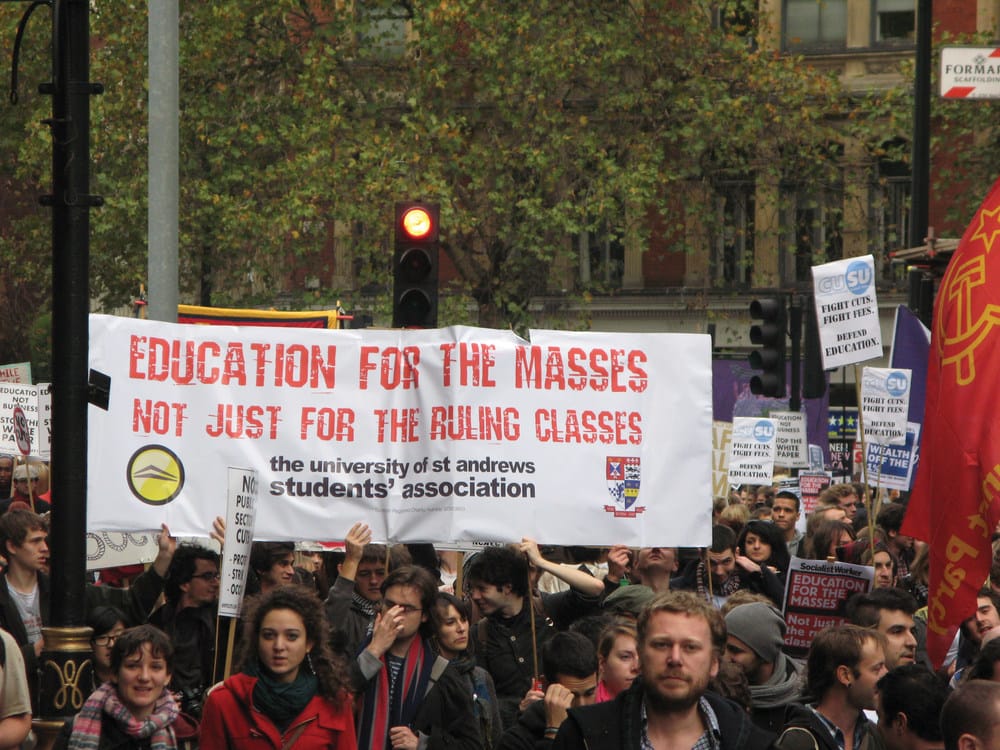Doth the lady protest too much?
Why protest is important and what it tries to achieve

It’s that time of year again. The placards will be waved and students will rapidly get bored of chanting, “No ifs. No buts. No education cuts.” Two student demonstrations are planned for November, with the first happening on the Wednesday just gone. However, this year, the fight is against the rapid increase in privatisation of universities discussed in the Government’s higher education white paper. After a full blown attack on the proposal of rising fees last winter (that had little effect on a government unwilling to listen) questions are being posed, such as: Why do we protest? What does it aim to achieve?
Protest is not indulged in for personal gratification, as only the masochistic would take enjoyment from traipsing around in freezing weather, the possibility of ‘kettling’, and the chance to become a stress toy for police aggression. Protest is instead a result of democratic breakdown. Ideally, we would never have to; policy would be dictated by what the people want, and large masses of the population would never feel the need to take to the streets. However, when the majority of people are prevented a voice; protest, a method of last resort, becomes more common. Neat examples of this are strikes. There is rising industrial action in this country as the Government refuses to negotiate on public sector cuts and is happy to support companies who wish to ignore their workers, forcing employees to strike. In Germany, however, the economic slump has not been accompanied by union agitation as negotiations were made early on in discussions with the workers. This vague attempt at democracy is increasingly lacking in this country.
Strikes are another poignant example of how people regularly argue against protest; they lament that it does nothing for their cause, and try to get others to share this viewpoint. However, any form of true protest will always generate enemies. If you try and raise your voice enough to be heard then it will be decided that your voice is too loud and you should shut up. As the anarchist saying goes, “If protest achieved anything, it would be made illegal.” The legal boundaries of protest are decided on what will allow people to feel a stance is being made without ever letting anything be achieved.
Government will never allow anything to happen that truly challenges its power. This is why the idea of state condoned protest is a paradox. If it is allowed by the state, it is because they have nothing to worry about. This is why protest has to make a stance in both its words and its actions. The Occupy London protest, which, although without demands, can be seen as being against raging inequality and corporate greed at the expense of the vast majority, is camping in the City of London. This is not only the location of what they are against, but is also an area of almost solely private property with the public space controlled by a bizarrely partially privatised local authority. St. Paul’s occupiers are not just requesting change; they are physically returning space to public use. It is this action that may cause its eviction by authorities. Protest is strongest when it enacts pre-figurative politics, that is, the action is the change you want to see. Hence, these coming student demonstrations and inevitable occupations of campuses will involve ‘free universities’ that attempt to create a new way of learning.
Although, as a possible ‘winter of discontent’ approaches we should remember that – when marches turn ugly as they go off a pre-described route, as students and lecturers strike on November 30 and lecture theatres are occupied – protest is a last resort due to a failing of democracy. Without acts that are possibly of some inconvenience and disturb the current law and order, nothing will be achieved. The suffragettes, a movement that few could disagree with, was not just people chanting in locations that were agreed by the police, it had many discomforting aspects. Windows were smashed, fires were started, bombs were thrown, and women died. Without these more militant actions, that raised the profile of the debate, women may still not have the vote. I personally don’t condone violent direct action, but we cannot start groaning every time pointless rules are broken (such as march route changes and not being allowed to camp on a pavement), otherwise the voices of the powerless will be drowned out even more, to our own detriment. Because protest is rarely selfish, it is for the benefit of all of us.








